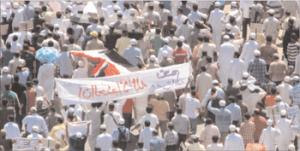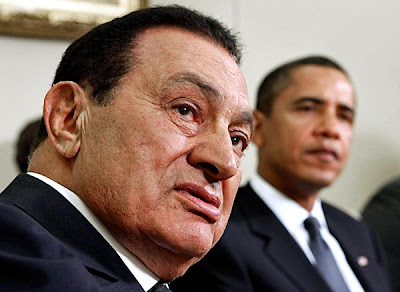Ahram Online
Military council fails to defuse mounting tales of torture in Egypt
Thursday 25 Aug 2011
Mostafa Ali

Soldiers arrive one mid-afternoon to break off a peaceful gathering in Tahrir Square. Days later, several young people recount scary ordeals and horror stories they claim they endured.
Amr, for example, a young Egyptian man who works in the TV and Radio Corporation, entered the Metro Station in Tahrir Square to take the train home around 2pm.
“On the stairs going into the station, three men in civilian clothes arrested me. They took my ID card and broke it into two pieces. They kicked and punched me around and then led me to a personnel carrier nearby,” Amr told El Nadeem Centre for the psychological rehabilitation of victims of violence and torture.
“In the crowded vehicle, soldiers cursed me and hit me all over my body repeatedly until I almost fainted. I found a few young men in the car who were also apparently beaten and we all had trouble breathing because it was inhumanely hot and stuffy in there. They drove us around for two hours until we arrived at the prison,” Amr continued, recounting his story as it appears on the Centre’s website.
“Soldiers welcomed us at the prison gate by hitting us with electric shock batons in sensitive parts of our bodies. They made us crawl on our stomachs into the jail yard while stepping down on us with their boots and lashing at us with their whips,” Amr recalled to El Nadeem.
Ahmed, a journalist, said that soldiers arrested him that same day as he headed towards a mosque near the square to perform his afternoon prayers.
“I told them that I am a journalist. They said they did not give a damn. They took us to a prison. They stripped us and made us crawl naked on the jail’s asphalt. My back is swollen and I might need surgery on my leg,” goes Ahmed’s account to El Nadeem Centre.
Zeinab, a young woman, said that soldiers abused her as she tried to help an elderly woman whom soldiers knocked down after she shouted at soldiers in defence of those being beaten.
“Some soldiers grabbed me, lifted my blouse and started slapping me straight on the flesh. They said that I was more or less a whore,” Zeinab told El Nadeem.
These stories are not of the horror and torture that Egyptians endured in the long years under the draconian rule of ousted president Hosni Mubarak. The peaceful gathering in question did not take place against one of the many facets of Mubarak’s repressive rule.
Moreover, the soldiers accused of brutality and torture were not members of the notorious State Security Intelligence core, which haunted and abused endless numbers of protesters and other ordinary citizens for decades to keep Mubarak safely in power.
The demonstration in question took place on 1 August 2011; seven months after Egyptians ousted Mubarak in a spectacular popular revolution.
The people accused of brutality in these cases were soldiers and officers in the Egyptian army, who were involved in the act of forcibly breaking up a 22-day sit-in by families of January 25 revolution martyrs and their supporters.
In the last few weeks, Egyptian revolutionaries, and local and international human rights activists, have been criticising the way in which the ruling military council, which is ultimately responsible for the behaviour of its soldiers, has administered authority since 11 February, the day it ousted Mubarak.
Activists have taken up the cause of more than 12,000 civilians that the council has tried in military courts for a range of alleged crimes and violations, as well as hundreds of people who have claimed that army soldiers and officers tortured them.
Several campaigns have been launched to demand that the council end its practice of trying civilians in military courts. Other campaigners work to expose the treatment, that they believe amounts to torture, of prisoners in military jails.
All along, the military council has denied, in statements it publishes regularly on its official Facebook page, that it does anything wrong.
Generals in the council have consistently argued that they have only tried those accused of crimes as serious as armed robbery and rape in military courts.
Moreover, the council has also repeatedly denied that its officers or soldiers have ever used unnecessary force, or tortured anyone they arrest or apprehend.
However, over the course of the last few months, human rights and other political activists have gathered an overwhelming amount of evidence through testimonies from people that the army arrested or jailed which show, beyond any reasonable doubt, that someone in the army has been doing something wrong all along.
In fact, some human rights organisations started documenting cases in which the army allegedly tortured citizens as far back as during the 18-day period of the popular uprising against Mubarak, long before the council formally assumed power.
On 17 February, for example, Amnesty International issued a report in which it called on the Egyptian army to stop its members from torturing citizens that they were apprehending on the streets of Cairo and other cities during those tumultuous days.
Amnesty, through numerous interviews it conducted with people detained by the army during the anti-Mubarak uprising, concluded that officers and soldiers stripped suspects of clothes, beat them, raped some and used electric batons, banned under international treaties, to electrocute them.
For example, in the case of one 18-year-old man that the army detained near the epicentre of the rebellion near Tahrir Square, Amnesty was able to establish that officers accused their suspect of being a foreign agent for Israel, subjected him to the illegal tactic of waterboarding to extract confessions, and later applied electric shocks to his body.
During the first few weeks after Mubarak left power, mass euphoria as well as unconditional and overwhelming public support for the ruling military council drowned out reports such as Amnesty’s or most, if any, criticism of the army’s treatment of civilians.
However, the issue resurfaced rather quickly by mid-March in the aftermath of the army’s treatment of people it detained when it broke up a sit-in in Tahrir Square on 9 March.
Activists posted videos on the internet showing marks of torture on the bodies of several individuals who alleged that officers and soldiers tortured them in a makeshift processing prison that the army set up in the Egyptian Museum on the outskirts of the square.
In one gruesome video, a young man named Khaled displayed tens of burn marks on his body, which he claimed that army personnel inflicted on him by using the same type of batons that others claimed were used against them.
Moreover, Khaled claimed in the same video that soldiers cut his hair with the broken shards of a soda bottle.
Finally, and perhaps potentially more damning for the army, 18 women arrested that day charged that army doctors performed virginity tests, which are illegal by international human rights standards.
Some international news outlets such as BBC Arabic shed light on the incident, which activists called the ‘Egyptian Museum torture tragedy’, as well as numerous other allegations that the Egyptian army might be in the business of torture.
Members of the ruling military council at first publicly denied that anything wrong took place in the confines of the Egyptian Museum. However, after human rights activists pressed the council both with convincing testimonies from people who said they were victimised, as well as street protests, the Generals agreed to open an investigation into the matter.
The army’s report found that its doctors performed virginity tests on some female detainees. However, it claimed that doctors did so only to defend themselves against any potential accusations of rape by the women. Finally, the report concluded that all other accusations of torture against the soldiers were baseless.
Until that point, local TV stations and newspapers chose to ignore the story, and did not bother to talk to any of the activists and bloggers who blasted the internet with numerous accounts from torture victims.
However, by the summer, many Egyptians who still politically supported the council in general started to pay more attention to those who had claimed for months that there was an element within the military that tortured detainees.
After months of hard legal and investigative work by hundreds of people, activists and lawyers such as those in the No to Military Trials campaign succeeded in pushing the issue of allegations of torture by the army (as well as its use of military tribunals) into the public sphere.
For example, three weeks ago, ON TV anchor Yousri Fouda pioneered a new tradition of airing video clips that journalists and other citizens shoot to document torture incidents that the army constantly denies.
Fouda’s widely watched late night news show, 'The Last Words', played a video of two plain clothes security officers beating a man minutes after army soldiers arrested him in Tahrir on 1 August in full view of military police personnel.
Abdel Rahman Ezz, a well-known TV journalist, happened to be the person who captured the footage on the video that ON TV aired. As if the army needed more bad publicity, Ezz shot the beating while he was himself in the army’s custody, after soldiers randomly arrested him in the square, and was sitting next to none other than the young men the soldiers had clearly just finished bruising up.
Towards the end of August, news reports came out that prisoners in the military prison of Hike Step in the suburbs of Cairo rioted against what they called inhumane incarceration conditions and possible torture inside the facility.
Once again, army spokespersons denied to newspapers that a riot over poor living conditions or torture took place at all. “Thugs and hardened criminals attempted to cause trouble, that was it,” the army asserted.
Ragia Omran, a well-known human rights lawyer, political activist and a co-founder of the No to Military Trials campaign, confirmed to Ahram Online that lawyers have filed numerous complaints with military authorities to document and protest incidents of torture.
However, Omran said that she does not believe that army officers and soldiers torture detainees in a systematic way. “Some officers and soldiers do use torture but others treat detainees in a more humane manner,” she said.
Corroborating this complicated picture is Khaled who says that while he was being beaten by electric batons in the Egyptian Museum by soldiers, a sympathetic army officer intervened, gave him pants and a shirt, and personally set him free.
“The problem I think has more to do with the fact that we are coming out of a long period in which Egyptian authorities in general showed no respect for issues such as human rights and the dignity of citizens,” Omran explained.
In fact, just a few weeks ago, the Egyptian Organization for Human Rights finally convinced the prosecutor-general to open an investigation into 900 torture cases, 200 of them leading to deaths in police stations, that it has been pursuing against the Mubarak regime since 1993.
This is all a start. Omran believes activists and the public need to continue organising and applying pressure on both the army and the police, in order to end the practice of military trials and root out the culture of abuse and torture against human beings.
*Photo courtesy of Reuters






















